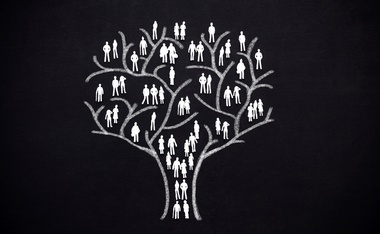The views expressed in our content reflect individual perspectives and do not represent the authoritative views of the Baha'i Faith.
The ancient Egyptians believed that their names were a reflection of their souls, which gave rise to the belief that a name could have a profound effect on a person’s destiny.
In this world, we name everything and everyone. A human being’s name, beyond the simple recognition that they exist, also has symbolic and even spiritual value.
The world’s best-known names command legions of followers – namely the messengers and prophets of God. Hundreds and perhaps thousands of those divine messengers have existed throughout human history, some whose names are now lost to the passage of time. Today the most well-known of those holy messengers – Krishna, Abraham, Buddha, Moses, Zoroaster, Jesus Christ, Muhammad and most recently Baha’u’llah – have become the subject of reverence and devotion for the vast majority of the planet’s peoples.
RELATED: All the Prophets: One and the Same Soul
They command our attention not only by their names, but by the principles they ascribed to and taught, and most importantly by their words, examples, and actions. In all cases, they refused to be bound by current standards, and promulgated new laws to govern human affairs based on peace and tranquility, cooperation and mutual affection. Their teachings and their followers established worldwide civilizations.
Yet because of disunity and mainly distrust among religions, humanity remains divided, in some places in armed camps, fighting, maiming, and killing other human beings over distorted or corrupted beliefs and ideologies or the desire for power and authority, even in the name of religion. The Baha’i teachings say this conflict and contention must cease:
… religion must be the cause of unity, harmony and agreement among mankind. If it is the cause of discord and hostility, if it leads to separation and creates conflict, the absence of religion would be preferable in the world.
Each of the prophets and messengers – those who Baha’is call the manifestations of God – wanted peace and security for all humankind. They all taught of one God, unknowable, the great Fashioner of the universe and of creation. They exemplified virtues like honesty and love, courtesy and justice. They suffered so we might not suffer, giving their lives to God to prove the truth of their convictions. These holy personages and their names have been spoken endless times and praised in countless ways. Their legendary lives, words, and actions fill books, and the effects of their lives and words on speakers and writers fill even more books, tablets, articles, blogs, podcasts, and websites.
Their teachings replicated and also built upon each other’s, such as the Golden Rule. Jesus Christ said, in Mathew 7:12: “All things therefore whatsoever ye would that men should do unto you, even so do ye unto them, for this is the law and the prophets.” Muhammad proclaimed: “Let none of you treat his brother in a way he himself would dislike to be treated.” Baha’u’llah wrote:
O son of man! Wert thou to observe mercy, thou wouldst not regard thine own interest but the interest of mankind. Wert thou to observe justice, choose thou for others what thou choosest for thyself.
Each messenger foretold the coming of another great teacher after them who would fulfill their promises, a process of the rise and fall of religious dispensations called progressive revelation in the Baha’i Faith. This progression has created a family tree of the names of the holy messengers, each spiritually related to the ones before. In every known society on Earth, humankind has been affected by one or more of these teachers, because they mirror divine attributes and lead people to better lives.
The followers of these manifestations have done many good acts, although some have perpetrated conflict, even torture and murder under the guise of religion. But true religion means belief in a God who only wants us to live in peace and felicity.
RELATED: Are the Prophets Related to Each Other?
No definitive list exists, but Baha’u’llah and Abdu’l-Baha referred to several personages as holy messengers or manifestations, including Zoroaster, Krishna, Gautama Buddha, all the Jewish prophets, Adam, Abraham, Noah, Moses, Jesus, Muhammad, the Bab, and most recently Bahaʼu’llah. Thus, the Baha’i teachings interpret religious history as a series of periods or dispensations where each manifestation brings a broader and more advanced revelation, suited for the time and place in which it was expressed.
What’s in a name? Abdu’l-Baha described them this way:
The holy Manifestations of God come into the world to dispel the darkness of the animal, or physical, nature of man, to purify him from his imperfections in order that his heavenly and spiritual nature may become quickened, his divine qualities awakened, his perfections visible, his potential powers revealed and all the virtues of the world of humanity latent within him may come to life.
These holy Manifestations of God are the Educators and Trainers of the world of existence, the Teachers of the world of humanity. They liberate man from the darkness of the world of nature, deliver him from despair, error, ignorance, imperfections and all evil qualities. They clothe him in the garment of perfections and exalted virtues.
Men are ignorant; the Manifestations of God make them wise. They are animalistic; the Manifestations make them human. They are savage and cruel; the Manifestations lead them into kingdoms of light and love. They are unjust; the Manifestations cause them to become just. Man is selfish; They sever him from self and desire. Man is haughty; They make him meek, humble and friendly. He is earthly; They make him heavenly. Men are material; the Manifestations transform them into divine semblance. They are immature children; the Manifestations develop them into maturity. Man is poor; They endow him with wealth. Man is base, treacherous and mean; the Manifestations of God uplift him into dignity, nobility and loftiness.
The names of the manifestations symbolize mystical, powerful, awe-inspiring calls to love, action, and devotion. In reality, the Baha’i teachings assert, those names are one. When we invoke those names, they ask us to live in harmony and peace with each other.
















Comments
Sign in or create an account
Continue with Googleor